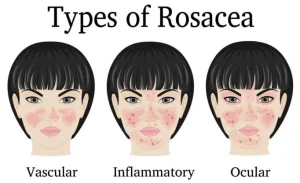Overview
Diagnosis
A healthcare professional usually diagnoses rosacea by examining the skin and asking about symptoms. Tests may be done to rule out other conditions that can look similar, such as psoriasis or lupus. Some signs, including flushing and visible veins, may be harder to see on brown and Black skin. Because of this, other symptoms such as facial stinging, swelling, bumps and dry-looking skin become especially important to notice.
If your symptoms affect your eyes, you may be referred to an eye specialist. Additional tests can help determine whether rosacea is causing eye irritation or other related problems.
Treatment
Treatment for rosacea depends on the type and severity of symptoms. If self-care measures don’t provide enough improvement, a member of your healthcare team may recommend prescription creams or gels. More-serious cases may require oral medicines, and laser procedures may help with flushing and visibly enlarged blood vessels. Symptoms often return even after successful treatment, so ongoing management is important.
Medicines
Medicines prescribed for rosacea vary based on specific symptoms. Some treatments work best for flushing, while others are more effective for bumps and pimples. You may need to try different medicines or combinations to find the most effective approach.
Common treatments include:
-
Skin-applied gels and creams such as brimonidine and oxymetazoline, which help reduce flushing by narrowing blood vessels. These may work within hours but the effect is temporary. Using them less often, such as before an important event, may help reduce rebound flushing.
-
Prescription topical treatments for pimples and bumps, such as azelaic acid, metronidazole and ivermectin. Improvement may take several weeks, and ivermectin may take longer but often has longer-lasting results.
-
Oral antibiotics such as doxycycline for more-serious rosacea with bumps and pimples.
-
Oral acne medicine such as isotretinoin for severe cases that don’t respond to other treatments. This medicine must not be used during pregnancy due to the risk of birth defects.
Laser treatment
Laser therapy can help reduce visible blood vessels and long-term redness. It often provides better results for these symptoms than creams or pills. However, it works best on skin that is not tanned, brown or Black because the laser targets visible blood vessels. Side effects may include redness, bruising and mild swelling for a few days. Rare side effects include blistering or scarring. On darker skin tones, there is a risk of long-term changes in skin color.
Results may take several weeks to appear, and repeat treatments may be needed to maintain improvement. Laser therapy is sometimes considered a cosmetic procedure and may not always be covered by insurance, so checking with your provider is recommended.
Advertisement

